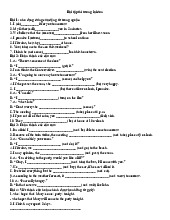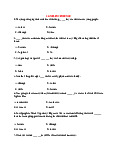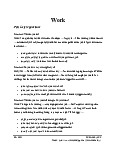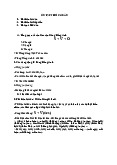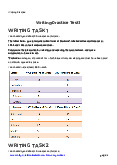



Preview text:
Basic English – Ms Hong Nhung PRESENT SIMPLE
Bài 1: Chia động từ tobe vào chỗ trống
1.My mobile phone ……is…. old. (be)
2.My Math teacher …is……. tall and thin. (be)
3.Beer …isn’t……. my favorite drink. (be/ not)
4.My parents …are……. good cooks. (be)
5.I …am not……. at school now. (be/ not)
6.My computer …aren’t……. expensive. (be/ not)
7.Comic books…are……. interesting. (be)
8.My close friend …isn’t……. at the cinema now. (be/ not)
9. ……are…… they your students? (be)
10. ……is…… his sister a teacher? (be)
Bài 2: Chia động từ vào chỗ trống thì hiện tại đơn
1. My brother always ................makes................ Saturday dinner. (make)
2. Ruth ..............don’t eat.................. eggs; they ...........make..................... her ill. (not eat; make)
3. "Have you got a light, by any chance?" "Sorry, I .............smoke..................." (smoke)
4. ...............does................. Mark ...............go................. to school every day? (go)
5. ................do................ your parents ..............like.................. your boyfriend? (like)
6. How often ................do................ you ................go................ hiking? (go)
7. Where ................does................ your sister .............work...................? (work)
8. Ann ...............doesn’t.................. usually .............have................... lunch. (not have)
9. Who .............does................... the ironing in your house? (do)
10. We ................hang................ out once a week. (hang)
Bài 3: Chia động từ ở thì hiện tại đơn
E.g. Liza ________ ________ her hair on Sunday. (usually/ wash)
=> Liza usually washes her hair on Sunday.
1. My brothers_____often___ ____sleep____ on the floor. (often/ sleep) 1
Basic English – Ms Hong Nhung
2. ___does_____ he ____sometimes____ _____stay___ up late? (sometimes/ stay)
3. I __always______ ____do____ the housework with my brother. (always/ do)
4. Peter and Mary_____never___ ___come_____ to class on time. (never/ come)
5. Why____does____ Johnson ____always____ ___get_____ good marks? (always/ get)
6. ____do____you ___usually_____ ___go_____ shopping? (usually/ go)
7. She ____seldom____ ____cries____ . (seldom/ cry)
8. My father ____never____ ____has____ popcorn. (never/ have)
9. He ____is____ __always______ late for school. (be/ always)
10. Her parents ____are____ ____usually____ busy on weekdays. (be/ usually)
Bài 4: Chia động từ theo thì hiện tại đơn cho đoạn văn sau
My cousin, Peter (have) ____has____ a dog. It (be) ___is_____ an intelligent
pet with a short tail and big black eyes. Its name (be) ___is_____ Kiki and it (like)
_____likes___ eating pork. However, it (never/ bite) ___never_____ ___bites_____
anyone; sometimes it (bark) ____barks____ when strange guests visit. To be honest, it
(be) ____is____ very friendly. It (not/ like) ___doesn’t_____ ____like____ eating
fruits, but it (often/ play) ____often____ ___plays_____ with them. When the weather
(become) ___becomes_____ bad, it (just/ sleep) ___just_____ ____sleeps____ in his
cage all day. Peter (play) ___plays_____ with Kiki every day after school. There (be)
__are______ many people on the road, so Peter (not/ let) ___doesn’t_____ ____let____
the dog run into the road. He (often/ take) ___often_____ ___takes_____ Kiki to a
large field to enjoy the peace there. Kiki (sometimes/ be) ___is_____
___sometimes_____ naughty, but Peter loves it very much.
Bài 5: Chia những động từ sau ở thì hiện tại đơn để tạo thành một bài IELTS
Writing task 1 có nghĩa.
The diagram below shows the stages and equipment used in the cement-making process,
and how cement is used to produce concrete for building purposes.
Summarize the information by selecting and reporting the main features and make comparisons where relevant. Write at least 150 words. 2
Basic English – Ms Hong Nhung
The diagrams (1 – illustrate)…………illustrate………………….the way in which
cement is made and how it is then used in the process of making concrete. Overall,
limestone and clay (2-pass)…………pass…………… through four stages before being
bagged ready for use as cement which then (3-account) ……account…………for 15% of
the four materials used to produce concrete. While the process of making cement (4-use)
…………uses……………..a number of tools, the production of concrete (4-require)
………requires………only a concrete mixer.
In the first stage of making cement, limestone and clay (5-be)………
are……..crushed together to form a powder. This powder (6-be)………is………then
combined in a mixer before passing into a rotating heater which (7-have)………
has………… constant heat applied at one end of the tube. The resulting mixture is
ground in order to produce cement. The final product is afterwards put into bags ready to be used.
Regarding the second diagram, concrete (8-consist)………consists………………
of mainly gravel, which is small stones, and this makes up 50% of the ingredients. The
other materials used are sand (25%), cement (15%) and water (10%). These are all 3
Basic English – Ms Hong Nhung
poured into a concrete mixer which continually rotates to combine the materials and ultimately produces concrete." (187 words, Band 9.0) 4
